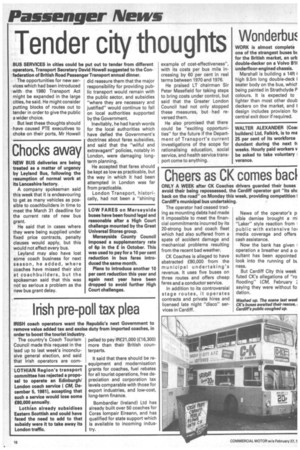Tender city thoughts
Page 14

If you've noticed an error in this article please click here to report it so we can fix it.
BUS SERVICES in cities could be put out to tender from different• operators, Transport Secretary David Howell suggested to the Confederation of British Road Passenger Transport annual dinner.
The opportunities for new services which had been introduced with the 1980 Transport Act might be expanded in the large cities, he said. He might consider putting blocks of routes out to tender in order to give the public a wider choice.
But lest these thoughts should have caused PTE executives to choke on their ports, Mr Howell did reassure them that the major responsibility for providing public transport would remain with the public sector, and subsidies "where they are necessary and justified" would continue to fall on local authorities supported by the Government.
Inevitably, he had harsh words for the local authorities which have defied the Government's doctrines about fares subsidies, and said that the "wilful and extravagant" policies, notably in London, were damaging longterm planning.
He accepted that fares should be kept as low as practicable, but the way in which it had been attempted in London was far from practicable.
London Transport, historically, had not been a "shining example of cost-effectiveness", with its costs per bus mile increasing by 60 per cent in real terms between 1970 and 1976.
He praised LT chairman Sir Peter Masefield for taking steps to bring costs under control, but said that the Greater London Council had not only stopped these measures, but had reversed them.
He also promised that there could be "exciting opportunities" for the future if the Department of Transport's current investigations of the scope for rationalising education, social service, and health service transport come to anything.


















































